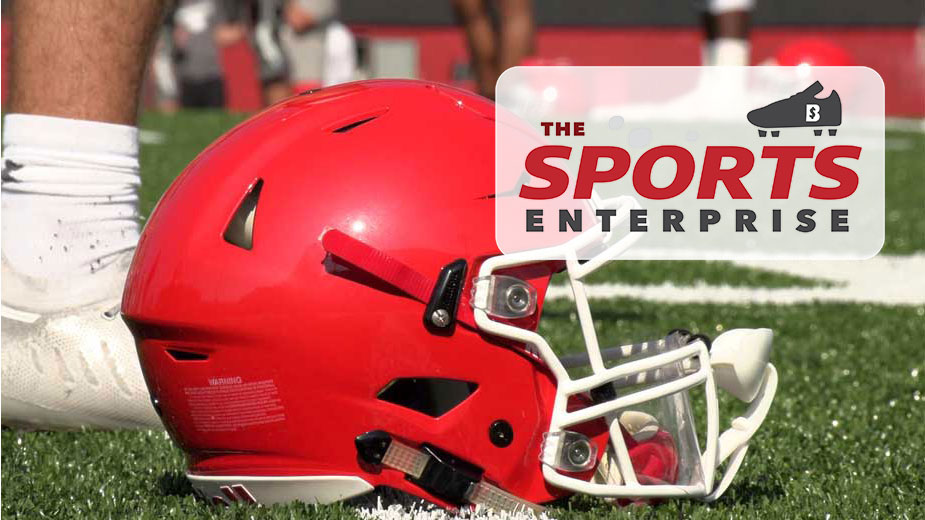Dollars and Sense of YSU Athletics
YOUNGSTOWN, Ohio – Youngstown State University’s baseball team raises between $40,000 and $60,000 of additional income every year through four major fundraisers and other efforts around campus.
Without these efforts, and the support of the community, the baseball program would not be able to provide its athletes the level of experiences expected at an NCAA Division I institution.
In fact, all of the 21 NCAA-sanctioned sports on the YSU campus rely heavily on fundraising to support their programs.
The baseball team raises money from a First Pitch Breakfast, two golf outings and a 100-inning intra-squad Wiffleball game. To start the upcoming season, the team will travel to Florida, Texas, Louisiana and Tennessee.
These funds are in addition to what the athletic department provides in its budget to help with travel expenses, equipment and new uniforms, says YSU head baseball coach Dan Bertolini.
“We try to do our best to supply our guys with the best student-athlete experience possible,” says Bertolini, who had a budget of more than $500,000 during the 2019-20 fiscal year.
“I think our athletic department does a great job funding our program. We’re very fortunate to have the budget that we have for our travel and our equipment, but there’s always things that come up that you need.”
Budgetary amounts
Ron Strollo, the university’s executive director of athletics, provides a variety of financial information annually to the institution’s board of trustees, which oversees all campus departments. His report displays the revenue and expenses along with how the athletic department compares to other league-affiliated and similar universities.
The YSU Board of Trustees approved a budget for the school’s athletic department of $17,790,127 for the 2021-22 fiscal year. That budget includes scholarship expenses, the salaries of 80 to 90 employees, operations of the school’s 21 NCAA-sanctioned sports for more than 500 student-athletes and the department’s administrative expenses. The budget consists of three equal categories: scholarships, salaries and operations.
There is a large change over the 2020-21 athletics budget of $15,483,627 – up $2,306,500 – but the change is more of a reflection of the sharp reduction in expenses due to the pandemic in 2020-21 than an increase in athletics spending.
The athletic department laid off or did not fill vacant positions totaling 22 of its staff in the 2020-21 budget to accommodate a dip in revenue largely because few tickets were allowed to be sold for games during the height of the pandemic. But revenue will increase by 14.9% in the current fiscal year to a more normalized figure. As a result, most of those 22 positions have been reinstated.
Strollo says his department made the self-imposed cuts to permanent and temporary employees, along with fringe benefits of almost $1.4 million because of the uncertainty heading into the 2020-21 fiscal year.
However, total budgeted revenue increased by $1.4 million this fiscal year.
Strollo is cognizant of the 26 academic programs and faculty positions that will be eliminated by fall 2022 as part of YSU’s cost-cutting efforts.
“We are part of this institution, and we play a variety of support roles,” Strollo says. “One of the most important is attracting students to YSU that would have not attended if it weren’t for the sports we offer. We take that role seriously. Hopefully with the data that we provide to the YSU Board of Trustees, we show that we’re accomplishing that.
“There’s always difficult decisions to be made in any organization as well as here on campus and I am confident those decisions are not taken lightly or without data to support them,” he continues. “Our role is to play our part the best we can.”
Revenue
Ticket revenues for football and basketball games increased more than $430,000 as restrictions on the number of fans were lifted, while $840,000 was derived from guarantee games – monies paid by bigger schools to attract schools like YSU to play them to fill their stadiums and arenas and likely lock in a win for the larger university.
YSU received no monies from guarantee games during the COVID year.
Those two factors, along with program sales, royalty commissions, program advertising sales and recognition, beverage company exclusive marketing/rights and miscellaneous, football tailgates and scoreboard advertising for football and basketball all increased – accounting for $2.28 million of the $3.95 million in revenue.
Concession commissions remained at $45,000 as well as Stambaugh Stadium loge rentals of $519,973. Much of the revenue generated by athletics is driven by the university’s corporate sponsorship programs.
“If you combine everything our corporate sponsorship team accomplishes, it equates to over $1 million worth of revenue annually to support our programs,” Strollo says.
The only budgeted decreases came with athletic trainers billing medical insurance companies for treatment of student-athletes [$50,000 to $45,000], NCAA revenue sharing [$1,150,000 to $1,050,000] and radio and television income [$100,000 to $10,000].
YSU added men’s swimming in 2019-20 and women’s lacrosse in 2021, and doubled the roster sizes of the school’s cross country teams. Football, basketball, women’s volleyball and tennis offer the most full scholarships to its athletes.
Those who are nonscholarship athletes pay their own tuition and fees. Only a small percentage of the more than 500 student-athletes receive full scholarships, most either receiving a small athletic scholarship or no scholarships at all.
“We wouldn’t have added these sports if it wasn’t going to bring a large number of new students and be a positive financial impact to campus,” Strollo says of men’s swimming and women’s lacrosse.
Track and field has more than 60 on each of its men’s and women’s rosters, making it the most cost-efficient program with almost a combined $1.5 million in net surplus during the 2019-20 fiscal year.
Only basketball, tennis and women’s volleyball operated in the red because of the number of players on full athletic scholarships.
Football turns a profit [$318,737 in 2019-20 fiscal year] because of the more than five dozen non- or partial-scholarship athletes and external revenue generated by the program.
Expenses
The $17,790,127 budget covers the expenses occurring in the athletic department with transfers and institutional work study.
Those expenses are: $5,868,461 (scholarships), $4,746,731 (operating), $4,616,175 (permanent staff), $2,046,550 (fringe benefits), $482,210 (temporary staff) and $30,000 (transfers and institutional work study students).
“I think we’re different from any other department on campus where our scholarship expense budget shows in our bottom line,” Strollo says. “The university as a whole has an entirely separate scholarship budget.
“So if the university raises tuition and fees, you will see a corresponding increase in the athletic scholarship budget. The result is an increase to the entire athletic department budget because scholarships make up such a significant portion of the overall departmental budget. That’s why you’ll see across the country athletic department budgets increase because tuition and fees are increasing nationally at such a high rate.”
The scholarships for student-athletes show up on the budget as an expense to the athletic department – but also as revenue for the university, because it receives tuition and fees from those student-athletes.
Comparison
During the 2019-20 fiscal year, YSU’s athletic expenditures were much lower than the average spent by other schools in the Missouri Valley Football Conference, Mid-American Conference and Horizon League.
YSU’s football team competes in the Missouri Valley Football Conference, while all other sports aside from women’s lacrosse and bowling are in the Horizon League.
The athletic expenditures for YSU was $16,292,051 – more than $13 million less than the Mid-American Conference average, and about $4 million less than the Missouri Valley Football Conference.
Strollo says even with spending much less than its peers, YSU offers more sports and has more student-athletes than these other institutions.
“Financially, we want to run the most cost effective, efficient program in the country,” he says. “We also want to generate more revenue than the average of our peers, and we have been able to do that.
“We want our teams to be competitive, win championships, and represent our city and the Mahoning Valley. This was supported last year by our bowling team going to the NCAA Final Four in only its fifth year of existence and us winning the school’s first Horizon League All-Sports Trophy. But most importantly, we want our kids – when they graduate – to feel confident that choosing YSU was the best decision they could have ever made.”
Copyright 2024 The Business Journal, Youngstown, Ohio.



